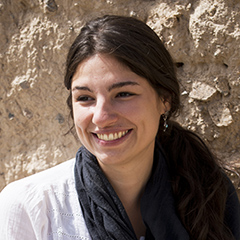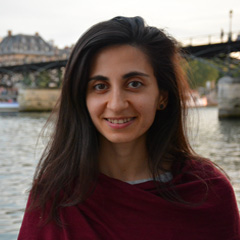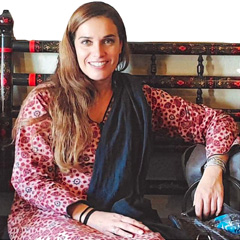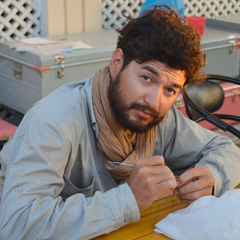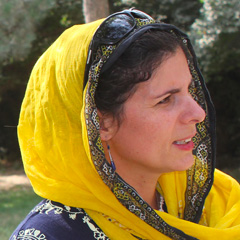The MAFIL has three members of management, a French and an Indian director and a deputy director on the French side. It also relies on seven regular collaborators, i.e. people who have been involved in the Mission since it was created or who devote part of their research time to it.
Over the course of a decade, MAFIL has attracted the scientific and technical skills of about fifty people (listed below as other collaborators).
Management
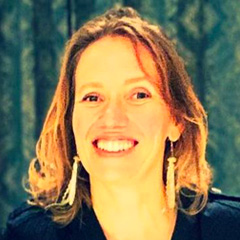
Laurianne BRUNEAU
Founder and Director of the Mission
Laurianne is an archaeologist specialised in Central Asia, South Asia and the western Himalayas, from the Bronze Age to the Buddhist period. She holds the chair “Introduction to the Arts & Archaeology of Inner Asia” at EPHE-PSL (Paris).
She is a permanent member of the East Asian Civilizations Research Centre and an associate researcher of the “Central Asian Archaeology research team” of the laboratory Archaeologies & Sciences of the Antiquity.
Drawing on her field experiences as a member of archaeological missions in Indonesia, Pakistan, Uzbekistan and Turkmenistan, she founded the Franco-Indian Archaeological Mission in Ladakh (MAFIL) at the end of 2012 and has since been co-directing it with her Indian counterpart. A list of her scientific publications is available on the HAL open archive.
M. Ajmal SHAH
Co-Director of the Mission for 2022-2024 (phase 3)
M. Ajmal Shah works as an Assistant Professor of Archaeology at the Centre of Central Asian Studies at the University of Kashmir (Srinagar). He completed his doctoral studies on the archaeology of Kashmir at Deccan College, Post Graduate and Research Institute, Pune, India. He has been actively involved in archaeological studies in Jammu and Kashmir for over a decade. Dr Shah is a recipient of the Tagore National Fellowship from the Ministry of Culture, Government of India, and has participated in numerous excavations in Haryana and Maharashtra. He also directed the excavations at Ahan, a Kushan site on the ancient Silk Road in the Kashmir Valley. In addition, he co-directed two international projects entitled “Archaeological studies of migration routes from Central Asia to Kashmir”, funded by the Gerda Henkel Stiftung (Germany) from 2015 to 2018. Dr Shah has published many research papers in national and international journals and presented his research at conferences in India, Sri Lanka, Europe, Russia and the USA.
Dr Ajmal Shah is a member of several national and international academic societies, including the Society of South Asian Archaeology (SOSAA), where he is Deputy Secretary. He has been a visiting scholar at the Institute of Archaeology and Ethnography of the Siberian Branch of the Russian Academy of Sciences, Novosibirsk, Russia. In October 2023 he was a visiting lecturer at EPHE-PSL, where he gave a series of lectures on the archaeology of Kashmir.
A list of his scientific publications is available on Academia.
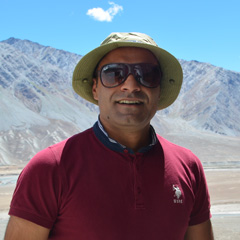
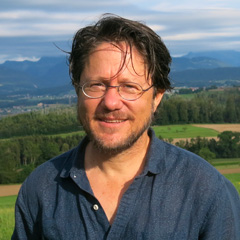
Martin VERNIER
Deputy Director of the Mission (2017-2018 and 2022-2024) and Temporary Director of the Mission (2019-2021)
Martin Vernier is the other founding member of MAFIL/MAFHI. He has been deputy director since 2017 and was interim director from March 2020 to August 2021.
Since the age of 16 he has spent almost every summer in Ladakh, learning the language, customs and traditions. As part of his studies in painting and sculpture at the Beaux-Arts, he spent a year in Dharamsala studying traditional Tibetan artistic techniques, and also collaborated with the Amnye Machen Institute (AMI) on museum and art education projects.
Since 1996, Martin has been working on the survey and study of Ladakh’s historical and archaeological heritage. Benefiting from a research grant, he spent two years (2003-2004) systematically exploring and documenting the petroglyphs of the region. He compiled his documentation in an electronic database and published the first monograph on Ladakhi rock art. He is now conducting parallel research into ancient Buddhist stelae and reliefs.
As part of his artistic training, he produces the archaeological drawings (material and architecture) for the mission.
Martin Vernier is an associated member of the “Trans-Himalayan Archaeology: Population Movements and Material Interactions, from Prehistory to the Buddhist period” research program at the “East Asian Civilizations Research Centre“. He is also an associate researcher of the Central Asian Archaeology research team of the laboratory Archaeologies & Sciences of the Antiquity.
A list of his scientific publications is available on the HAL open archive.
Vinod NAUTIYAL
Co-Director of the Mission for 2017-2018 (phase 2)
Vinod Nautiyal is Professor of Archaeology at HNB Garhwal University (Srinagar, Uttarakhand), India. Over the past 37 years, Prof. Nautiyal has carried out numerous survey and excavation campaigns in the Garhwal Himalayan region. For 10 years he was co-coordinator of the Special Assistant programme of the University Grant Commission (UGC). For the last five years, his research has focused on the trans-Himalayan region of Kinnaur (Himachal Pradesh), where he supervised the excavation of two major burial sites at Lippa and Kanam. This pioneering work has helped to place this frontier region at the heart of archaeological research on the Indian subcontinent.
In addition to his archaeological fieldwork, Prof. Nautiyal has a keen interest in the application of innovative scientific techniques in archaeology, particularly 3D visualisation of artefacts. From 2003 to 2005, he helped set up the Department of Science and Technology’s DST-NSF international collaborative programme (in collaboration with North Dakota State University, USA). In 2006 and 2015-2016, Vinod Nautiyal was actively involved in the Global Virtual Classroom Initiative in 3D VR models under the Indo-US S&T (Science and Technologies) programme with Virginia Commonwealth University.
A member of several academic bodies, Prof. Nautiyal has travelled extensively. He has lectured extensively on Himalayan archaeology in India and abroad as a visiting professor. He was Invited Professor at EPHE-PSL in November 2016 where he delivered a series of lectures on the archaeology of the Central Himalayas. Over the past 25 years, he has published in national and international journals while supervising doctoral students.
A list of his scientific publications is available on Academia.
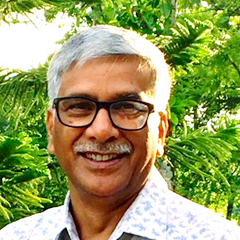
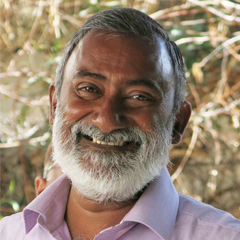
Simadri Bihari OTA
Co-Director of the Mission for 2013-2016 (phase 1)
S. B. Ota was one of the Deputy Directors of the Archaeological Survey of India, Delhi. Until 2015, he was based in Bhopal as Regional Director (Central Zone) for the same institute. He was also Director of the National Museum of Man (Indira Gandhi Rashtriya Manav Sangrahalaya, Bhopal).
S. B. Ota is a prehistorian. His recent research projects include the study of the Acheulean site of Tikoda in Madhya Pradesh and the prospecting of transhumance sites in Ladakh, where he has been exploring since the early 1990s. As a member of the ASI, S. B. Ota has carried out work throughout India and directed conservation projects on several national monuments. He has also been responsible for the UNESCO World Heritage sites of Sanchi, Khajuraho and Bhimbekta.
A list of his scientific publications is available on Academia.

